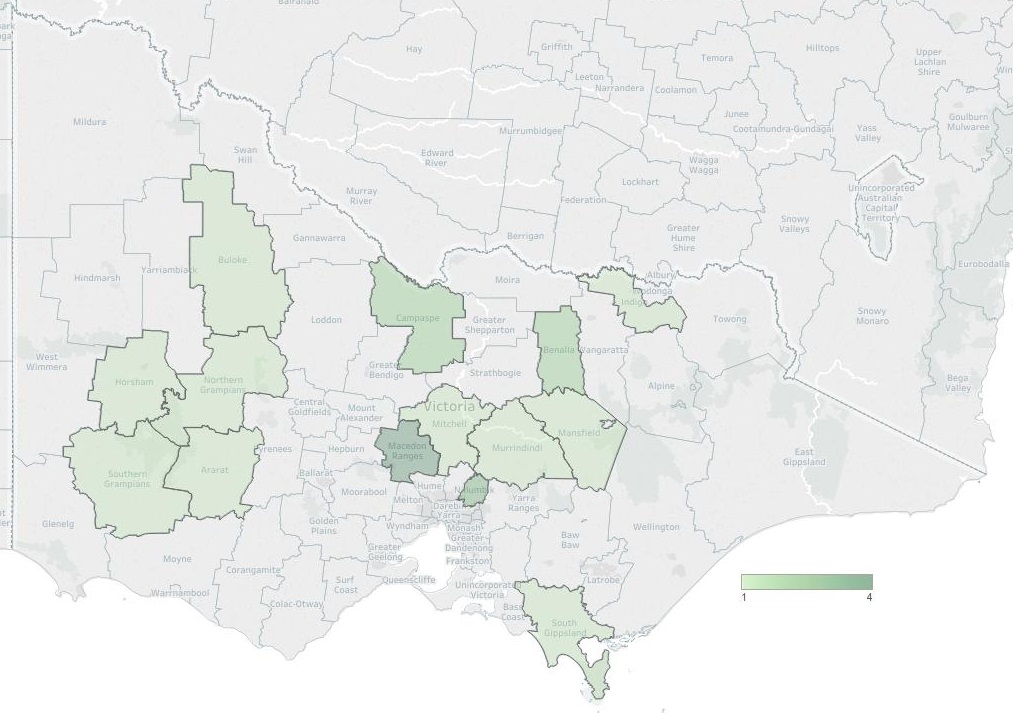Equine arbovirus project update
In response to flooding across Victoria in 2016, the Department of Health and Human Services (DHHS) have provided funding for the investigation of clinical signs typical of mosquito-borne arboviral infection in Victorian horses.
In early February, private veterinary practitioners in Victoria were sent information advising them of how they could participate in the enhanced equine arbovirus surveillance project.
The project provides free laboratory testing for Ross River virus (RRV), Murray Valley encephalitis, Kunjin and Hendra viruses and includes subsidies to veterinarians to cover the cost of undertaking investigations.
As of 28 February, there have been 21 investigations submitted to AgriBio (Figure 1).
Figure 1 shows the location of investigations by shire, where colour intensity indicates the number of properties investigated.

- Ararat – 1 investigation
- Buloke – 1 investigation
- Campaspe – 2 investigations
- Delatite – 2 investigations
- Horsham – 1 investigation
- Indigo – 1 investigation
- Macedon Ranges – 4 investigations
- Mansfield – 1 investigation
- Mitchell – 1 investigation
- Murrindindi – 1 investigation
- Nillumbik – 3 investigations
- Northern Grampians – 1 investigation
- South Gippsland – 1 investigation
- Southern Grampians – 1 investigation
The most commonly reported signs in the horses examined were depression, ataxia, weight loss, oedema and pyrexia (Table 1).
Table 1: Signs reported in horses investigated for arbovirus infection. (Note: multiple signs were observed in most horses.)
| Sign | Number of horses |
|---|---|
Depression | 12 |
Ataxia/incoordination | 7 |
Weight loss | 7 |
Oedema | 6 |
Pyrexia | 5 |
Muscle fasciculation | 4 |
Lameness | 4 |
Anorexia | 3 |
Colic | 3 |
Other behavioural change | 2 |
Hyperaesthesia | 2 |
Hypermetria | 2 |
Listlessness/lethargy | 2 |
Recumbency | 2 |
Circling | 1 |
Seizures | 1 |
Stiff gait | 1 |
Initial results
- All samples have been submitted to the Australian Animal Health Laboratory in Geelong for Hendra exclusion testing with all results indicating no evidence of infection.
- Two samples so far have returned positive results on testing for flavivirus. The flavivirus ELISA detects antibodies to both Kunjin and Murray Valley Encaphalitis (MVEV) virus. One sample has been identified as Kunjin positive and the other as likely MVEV. Further testing will be undertaken to determine if these results are related to recent infection.
- Ross River virus results are pending the submission of the re-bleed samples for 21 horses. The first of these results is expected shortly as a number of veterinarians have begun submitting their follow-up samples.
Final results of the surveillance project will be presented in later editions of VetWatch.
More information about what is involved in the project and how you could become involved is available on the Arboviral disease in horses page.